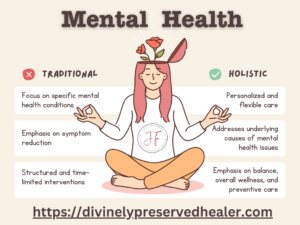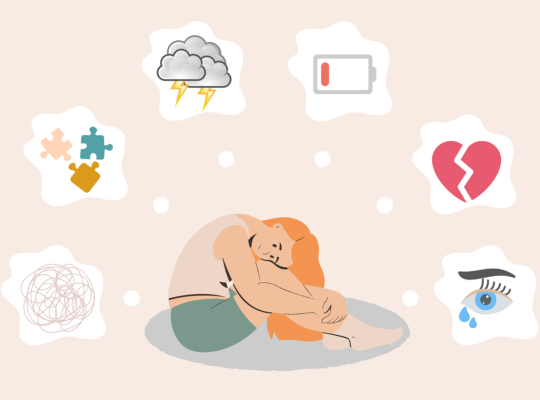In our fast-paced, modern world, mental health challenges have become increasingly prevalent. While traditional approaches often focus solely on the mind, a holisticA healing approach that looks at the whole person and not just their physical symptoms, in order to eradicate illness and produce well-being in the mind, body, and soul. wellness perspective recognizes that mental health is deeply interconnected with our physical, emotional, and spiritual well-being. By healing the whole person, we can achieve a more balanced, fulfilling life. Before we explore how to tackle mental health holistically speaking, let’s first explore the conventional approach.
Allopathic (Conventional) Approach
Allopathic medicine, also known as conventional or Western medicine, typically focuses on diagnosing and treating specific symptoms or conditions with standardized, evidence-based interventions. When it comes to therapy, the allopathic approach has a few key characteristics:
1. Focus on Specific Mental Health Conditions: Allopathic therapy often targets specific mental health diagnoses such as depression, anxiety, bipolar disorder, or schizophrenia. Treatments are tailored to address the symptoms associated with these conditions.
2. Evidence-Based Practices: Therapies used in the allopathic approach are based on scientific research and clinical evidence. Common therapeutic modalities include:
- Cognitive-Behavioral Therapy (CBT): Focuses on changing negative thought patterns and behaviors.
- Dialectical Behavior Therapy (DBT): Combines cognitive-behavioral techniques with mindfulness to treat conditions like borderline personality disorder.
- Psychodynamic Therapy: Explores unconscious patterns and past experiences to understand current behavior.
- Medication Management: Often used in conjunction with therapy to manage symptoms of mental health disorders. Psychiatrists may prescribe antidepressants, antianxiety medications, antipsychotics, or mood stabilizers.
3. Structured and Time-Limited Interventions: Allopathic therapy typically involves structured, time-limited sessions focused on achieving specific therapeutic goals. Treatment plans are often designed to be completed within a certain number of sessions.
4. Emphasis on Symptom Reduction: The primary goal of allopathic therapy is often the reduction of symptoms and improvement in functioning. Therapists work to alleviate distressing symptoms and help clients develop coping strategies.
Holistic Approach
The holistic approach to therapy views mental health as interconnected with physical, emotional, and spiritual well-being. This perspective emphasizes treating the whole person rather than just addressing specific symptoms or conditions. Key characteristics of the holistic approach include:
1. Integrative Treatment: Holistic therapy often incorporates a combination of conventional therapies and alternative or complementary practices. This integrative approach may include:
- Mindfulness and Meditation: Practices that promote present-moment awareness and emotional regulation.
- Nutritional Counseling: Focus on diet and nutrition to support overall health and mental well-being.
- Exercise and Physical Activity: Incorporation of regular physical activity to improve mood and reduce stress.
- Acupuncture and Herbal Medicine: Traditional practices that can support mental and physical health.
2. Addressing Underlying Causes: Holistic therapy aims to identify and address the underlying causes of mental health issues, rather than just alleviating symptoms. This may involve exploring lifestyle factors, past trauma, and overall life satisfaction.
3. Personalized and Flexible Care: Holistic therapy is highly individualized, recognizing that each person’s path to wellness is unique. Treatment plans are flexible and tailored to the specific needs and preferences of the client.
4. Emphasis on Balance and Wellness: The holistic approach emphasizes achieving balance and overall wellness. Therapists work with clients to enhance their physical health, emotional resilience, social connections, and spiritual fulfillment.
5. Long-Term and Preventive Focus: Holistic therapy often adopts a long-term perspective, focusing on preventive care and sustainable lifestyle changes. The goal is to promote lasting well-being and prevent future mental health issues.
Comparing the Two Approaches
 Allopathic Approach:
Allopathic Approach:
- Focus on specific mental health conditions
- Utilizes evidence-based practices like CBT, DBT, and medication
- Structured and time-limited interventions
- Emphasis on symptom reduction
Holistic Approach:
- Integrative treatment incorporating conventional and alternative practices
- Addresses underlying causes of mental health issues
- Personalized and flexible care
- Emphasis on balance, overall wellness, and preventive care
Conclusion
Both allopathic and holistic approaches have their strengths and limitations. Allopathic medicine excels in treating acute conditions, providing quick symptom relief, and utilizing evidence-based practices. However, it often falls short in addressing the interconnectedness of physical, mental, and emotional health, leading to a more fragmented approach to care.
Holistic medicine, on the other hand, emphasizes treating the whole person, focusing on long-term wellness, and integrating various aspects of health. However, it may lack the rigorous scientific backing and standardized protocols found in allopathic medicine, and its emphasis on natural remedies and lifestyle changes can delay immediate symptom relief for acute conditions.
A combined approach that leverages the strengths of both allopathic and holistic medicine may offer the most comprehensive and effective path to health and wellness. This integrative model can address immediate health concerns while also promoting long-term well-being and balance.





